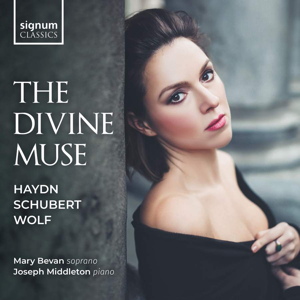
The Divine Muse
Mary Bevan (soprano), Joseph Middleton (piano)
rec. 2019, All Saints’ Church, East Finchley, London
Sung texts with English translations enclosed.
Reviewed as download from press preview.
Signum Classics SIGCD606 [64]
In March this year I reviewed a French language disc with soprano Mary Bevan titled “Visions Illuminées” and regretted in the opening paragraph that I had missed her two previous recitals. Since I soon found out that nobody else had reviewed it on MusicWeb, I decided to attend to that, and here is now “The Divine Muse”. Its companion, “Voyages“, will follow in due time.
Three Austrian composers from three generations share the space, but the first two tracks are sung in Italian, which at first puzzled me. I had difficulty sleeping one night and went up and put this disc into the player, without turning on the light. I heard something that sounded very Schubertian – but didn’t recognize it. I continued listening, blindfold so to speak, to the very end. I was quite enthralled by the unity of atmosphere: sacred in a hard-to-define way. When I took out the booklet and read Mary Bevan’s notes, I got the clue:
“… the idea for this album came when Joseph Middleton wanted to create a programme that reflected my interest in mythology and the history of religion (I read Anglo-Saxon, Norse and Celtic Studies at Cambridge). In thinking along these lines, we found a wealth of texts set to music which were inspired by people (mostly women as it turned out) who lived within the spheres of myth and divinity, i.e. they were ‘other-worldly’ but yet suffered all the pains of humanity. Or they were of the earth but the experiences they lived through set them apart from others. Jesus himself appears throughout the programme, as does his mother Mary, since themes of Christianity often inspired poetic texts and indeed art forms of all kinds. It is because these heroes and heroines lived through moments of intense pain or drama that their stories have great emotional depth.”
It says a lot about the composers’ ability to create the atmosphere of the poems and convey it to me in musical terms alone – since I didn’t have the texts at hand in my self-chosen darkness. If there is a weakness in this concept it is possibly a sense of sameness: predominantly slow tempi and limited dynamics – but you needn’t play the whole programme in one sitting.
Some comments to the individual songs: Schubert’s Vedi, quanto adoro is an aria from Metastasio’s first full-length opera libretto Didone abbadonata. Schubert had ambitions to become established as opera composer, but none of his many attempts in that genre has gained a foothold in the repertoire. He was no dramatist but isolated arias can be very attractive and this certainly is. Son fra l’onde, also to a Metastasio text, is the work of a 16-year-old boy who already knew his trade. Both works are rarely heard. It is worth noting that Goethe’s Ganymed is heard here in settings by both Schubert and Wolf, which of course invites interesting comparisons. They differ a lot, but both are great in their respective realms. As for the remaining Wolf songs, the majority of them are Mörike settings, and that’s where Wolf often is at his very best. He crowns the whole programme with Schlafendes Jesuskind, certainly one of the warmest and most heartfelt songs in this genre. Mary Bevan sings it with the outmost simplicity and Joseph Middleton’s accompaniment is so sensitive. The final phrases are magically delicate. Something of an odd bird is Haydn’s Arianna a Naxos, a relatively late work, which was a great success during his first visit to London in 1791. It isn’t a song, rather a cantata in four movements, which has been recorded many times. This reading is among the best I’ve heard.
Throughout the recital Mary Bervan pours out golden tone that floats effortlessly over the sensitive accompaniments by Joseph Middleton – and there is no lack of expressivity. Richard Stokes’ liner notes on the songs are a further asset. I profited greatly by this programme and am sure others will do as well.
Göran Forsling
Help us financially by purchasing from


Contents
1 Vedi, quanto adoro, D.510 Franz Schubert (1797-1828) [4.29]
2 Son fra l’onde, D.78 Franz Schubert [1.48]
3 Die Götter Griechenlands, D.677 Franz Schubert [4.06]
4 Ganymed, Goethe Lieder No. 50 Hugo Wolf (1860-1903) [5.26]
5 Zum neuen Jahr, Mörike Lieder No. 27 Hugo Wolf [1.51]
6 Seufzer, Mörike Lieder No. 22 Hugo Wolf [2.34]
7 Gebet, Mörike Lieder No. 28 Hugo Wolf [2.38]
8 Gesang Weylas, Mörike Lieder No. 46 Hugo Wolf [1.43]
9 Ganymed, D.544 Franz Schubert [4.06]
Arianna a Naxos, Hob XXVIb:2 Joseph Haydn (1732-1809)
10 No 1, Recitative: Teseo mio ben! [4.54]
11 No 2, Aria: Dove sei, mio bel tesoro? [4.16]
12 No 3, Recitative: Ma, a chi parlo? [3.19]
13 No 4, Aria: Ah! che morir vorrei [3.58]
14 Geistliches Lied, Hob XXVI:17 Joseph Haydn [3.33]
15 Gott im Frühlinge, D.448 Franz Schubert [1.57]
16 Marie, D.658 Franz Schubert [1.30]
17 Wie glänzt der helle Mond, Alte Weisen No. 6 Hugo Wolf [3.42]
18 Auf ein altes Bild, Mörike Lieder No. 23 Hugo Wolf [2.26]
19 Die ihr schwebet, Spanisches Liederbuch No. 4 Hugo Wolf [2.43]
20 Schlafendes Jesuskind, Mörike Lieder No. 25 Hugo Wolf [3.36]


















